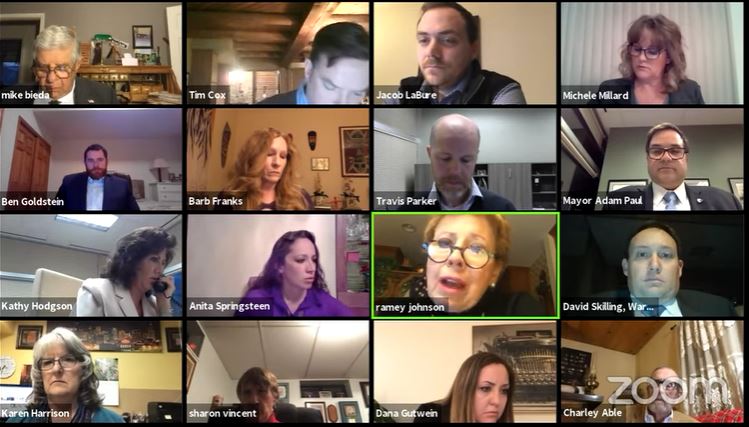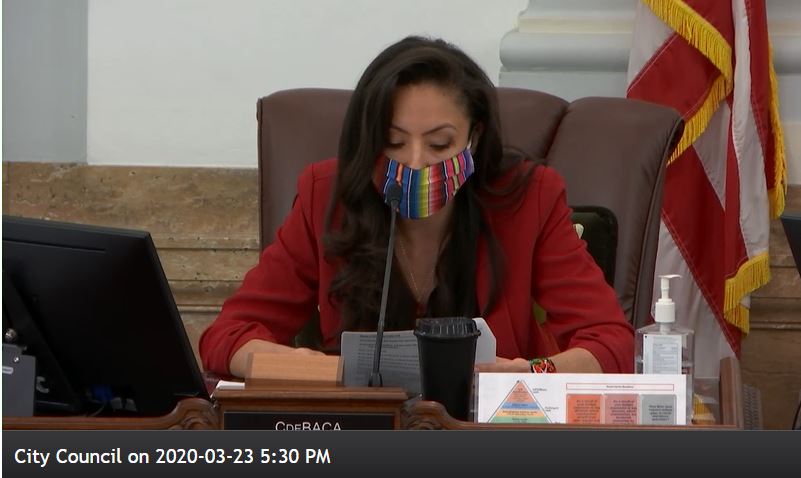By Jeffrey A. Roberts
CFOIC Executive Director
Lakewood City Attorney Tim Cox called it “almost a chicken and egg situation.” For city council members to legally conduct electronic meetings – like the one they were conducting via Zoom when Cox spoke to them Monday evening – they had to pass an emergency ordinance to allow electronic meetings.
“If you don’t approve this ordinance tonight authorizing the virtual meetings, then arguably after the vote is taken on this ordinance you’ll have to adjourn because virtual meetings would not be authorized,” he advised the 11 councilors.

Throughout Colorado and the nation, local and state officials are grappling with bizarre situations like this as they try to conduct the public’s business while also striving to keep themselves and their constituents safe from COVID-19.
This means limiting or banning in-person attendance at meetings subject to open meetings laws but still finding ways to comply with those laws and allowing public participation. It also might mean skirting some of the rules, at least temporarily. At least nowadays, many local public bodies regularly livestream their meetings and make the recordings available afterward.
Electronic and telephone meetings are permitted under the Colorado Open Meetings Law, aka the Sunshine Law, but some cities’ charters or ordinances don’t allow councils to meet this way, leading to situations like Lakewood’s.
After a discussion lasting 1¼ hours, Lakewood councilors adopted the emergency ordinance, which also grants extra powers to the city manager, but some weren’t happy the document wasn’t on the agenda or in the council packet made available to the public.
“The public that’s watching us has no idea what we’re talking about, and I think that’s a shame,” said Councilor Charley Able, who used to be a reporter for the Rocky Mountain News.
“There must be a public hearing, for an ordinance to be passed, that’s duly posted,” said Councilor Anita Springsteen, the lone vote against the emergency measure. “I’m having a hard time understanding the lack of notice, why this just came out at 1 o’clock today and who knew about this first before the rest of the council.”
Cox acknowledged the emergency ordinance was “a vivid example of the absence of public input.” But in emergencies, he added, things like the public’s right to be heard “get sacrificed in some cases because action has to be taken in order for the government to function in some reasonable way.”
The Lakewood council’s use of Zoom provided those who tuned in on the city’s website with a view not unlike the opening of the “Brady Bunch” – each council member occupying a separate tile on a computer screen. The city accepted public comments until noon Monday via telephone and an online portal called Lakewood Speaks.
Local public bodies in Colorado are using various technologies for virtual meetings. Some haven’t figured it out yet, and some have continued to meet in person – at least for now.

The Denver City Council met briefly in the council chambers Monday – council member Candi CdeBaca wore a mask over her mouth and nose – and adopted emergency rules that will allow councilors to participate in meetings electronically or by telephone and be counted as part of a quorum.
In Aurora on Monday, Mayor Mike Coffman and some city staff members were seated at a conference table while most other council members participated in their meeting by teleconference, although not everyone used a webcam. The council adopted a resolution to suspend rules that require in-person attendance at meetings or prohibit remote attendance or comment by the public. The city set up a separate email address to accept public comments, which were read aloud by a staffer during the online meeting.
“When is toilet paper going to be available in stores again?” one resident wanted to know.
Meeting in a mostly empty chambers Monday, the Grand Junction City Council also adopted a resolution allowing virtual meetings, provided at least three members are physically present. But the council failed to get the unanimous approval it needed for an emergency ordinance authorizing the spending of $4.4 million to hire temporary city workers as an economic stimulus. Two council members objected, and the vote was put off to a special meeting Wednesday.
“I’m really uncomfortable making a decision tonight about $4.4 million without having given our community a chance to provide any feedback – making a decision at a meeting where we’re not allowing public comment and we didn’t provide 24 hours’ notice,” said council member Anna Stout.
Paonia town trustees met in person Tuesday evening – several feet apart from one another – and livestreamed their discussion on YouTube as they’ve been doing for a while. Before they voted to allow virtual board meetings in emergency situations, town resident Suzanne Watson encouraged them to think about how they will connect with people like her who don’t have internet access.
Watson, a former town trustee, told the Colorado Freedom of Information Coalition she uses a $10-per-month flip phone and an old iPad that has a hard time loading YouTube videos. Even if it works, she’s worried about finding a wifi connection now that the library and town hall are closed.
“I like to know what laws are being passed, and I want to know (the trustees) are following state statutes,” Watson said. “When they pass laws and resolutions, those are things that affect me in my life and I want to be able to comment. I want to be able to know what’s going on.”
The Paonia trustees set a special meeting for April 2 to try out the technology they decide to use.
Follow the Colorado Freedom of Information Coalition on Twitter @CoFOIC. Like CFOIC’s Facebook page. Do you appreciate the information and resources provided by CFOIC? Please consider making a tax-deductible donation.




